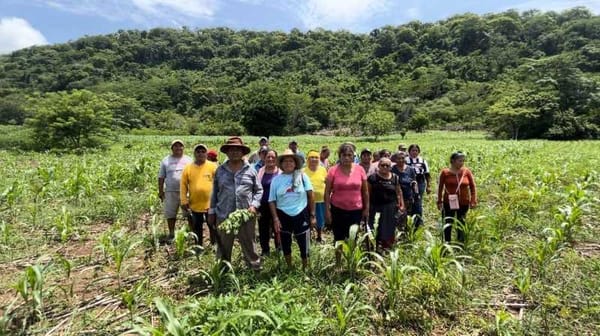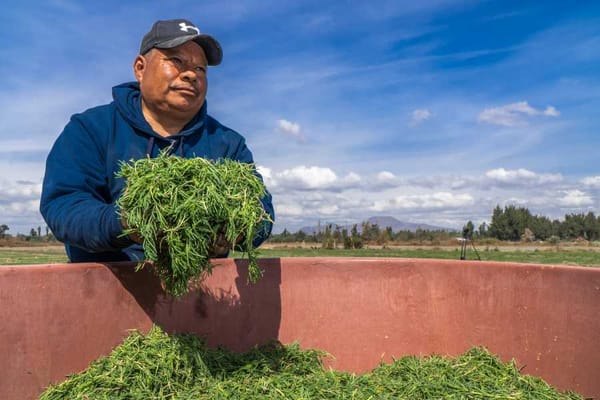Human trafficking, a universal crime
This indicates the complexity of the problem of human trafficking and the difficulty in categorizing it as such. World Anti-Trafficking Day is commemorated on July 30.

Human trafficking is a universal crime because "it does not only refer to Mexico or any particular federal entity, but it is all over the world, which indicates the complexity of the problem and the difficulty to classify it as trafficking," said Cynthia Acosta Ugalde, coordinator of the Internal Commission for Gender Equality of the Faculty of Higher Education (FES) Acatlan.
On the occasion of World Anti-Trafficking Day, it states that it is considered clandestine, violent, and difficult to identify crime. It is a crime and a serious threat to dignity and physical integrity, human rights, and development. Individuals who are trafficked from one place to another - within the borders of the same country or abroad for exploitation, mostly sexual, labor, or begging - are considered merchandise, objects that can be exploited and traded for profit.
The ephemeris was proclaimed in 2013 by the United Nations General Assembly, and July 30 was designated to raise awareness of the situation of victims of human trafficking, as well as to promote and protect their rights. In September 2015, countries adopted the 2030 Agenda for Sustainable Development and agreed to meet the goals and targets related to the fight against this illicit.
According to the expert, the so-called slavery of the 21st century has multiple modalities and consists of "hooking" people through deception, promises, or fraud to subject them to various illicit activities such as sexual exploitation (mainly of women and girls), child pornography, organ trafficking, begging, forced labor, sex tourism, drug trafficking, as well as recruitment against their will by organized crime, for example.
Study of the problem of human trafficking
The National Autonomous University of Mexico has the Extraordinary Chair "Trafficking in Persons", through which it studies, promotes, and disseminates the fields of work and contributions on the subject of national and foreign specialists distinguished in teaching, creative, or research work.
According to data from this academic activity, the analysis of the phenomenon is a difficult and complex task. There is no consensus on the real magnitude of the problem at a national or international level since different methodologies have been used to measure it, in addition to the difficulties involved in its quantification due to its nature.
"Therefore, it is difficult to have an accurate estimate given the limited availability of reliable statistics and the high level of non-reporting. Hence, the estimated figures are abruptly different. Currently (2017), the difference in the estimated number of victims in the world is equivalent to 20 million, but ranges between 21 and 48.5 million people subjected to some form of trafficking," the Chair's website states.
The Extraordinary Chair "Trafficking in Persons" carries out an online diploma course on the subject, an enormous university effort to raise awareness about this global social phenomenon, emphasizes Cynthia Acosta.
No one escapes
Human trafficking is a violation of individual rights and a form of criminal conduct with a global impact. Some countries are the origin, transfer, and destination of victims of this phenomenon, one of them is Mexico -particularly minors, behind Thailand and Cambodia-;, as it was announced at the time, we are the third country on a global scale, which shows the seriousness of this crime, warns the university expert.
Most of the people affected are from vulnerable groups, although anyone can be captured and deprived of their freedom to be "hooked". "Women, minors, the elderly, indigenous people, people with disabilities, and the LGBTIQ community," Acosta Ugalde points out.
The specialist recalls that in the case of those who live alone because they have no family or because they come from another country and do not have personal documents, no one looks for them. On the other hand, for those who have family ties and established schedules for leaving and arriving home, when they do not return immediately, alarms are set off.
There is a generalized vision that this crime is only sexual exploitation, but this is not the case. In the case of people with disabilities or the elderly, for example, they are used to begging for alms; the serious thing is that society normalizes this situation, "we take it for granted that this is normal and it should not be so because surely behind it there is a trafficking situation, with abuses, violations of their rights and mistreatment".
The same happens with sexual exploitation. In different parts of Mexico City where young women and girls are observed in this condition, it is certainly human trafficking in plain sight and we have normalized it. A good part of society surely does not question whether they are there against their will, or for pleasure. "That also makes this situation an even more complex crime."
One of the greatest challenges of this social phenomenon is to measure its real magnitude in an illegal market that is confused with legal scenarios, warns the jurist.
In view of this, she stresses that it is necessary to stop considering this illegal activity normal. "Let's stop thinking that those who are begging for alms and that the girl who prostitutes herself does it because they chose the easy job; let's stop thinking what are the migrants doing crossing our territory, why didn't they stay in their country, how is the situation in their countries that led them to cross such a dangerous territory as the Mexican one? Nobody abandons their place of origin where they could have development opportunities, and many of these people end up in the sale and purchase of human beings".
It is worth remembering that figures from the National Institute of Statistics and Geography released in September 2021, indicated that (in 2020) 21.2 million people aged 18 and over were victims of trafficking, which represented a crime prevalence rate of 23,520 victims per one hundred thousand inhabitants.
Likewise, this organization reported that 28.4 percent of the households in the country had at least one member who was a victim of this crime; in 93.3 percent of the cases there was no report, or the authorities did not initiate an investigation, that is, "what is called "black number".
Meanwhile, in the "Diagnosis on the situation of human trafficking in Mexico 2021. Procuring and imparting justice", the National Human Rights Commission highlighted that in 2020 the highest number of victims was identified, with 1,72 in total.
"In that period, 3 thousand 896 victims of human trafficking crimes were identified, of which 2 thousand 934 are women and 798 are men. Of those identified, 1,45 correspond to minors under 18 years of age. Likewise, of the total number of men, 505 correspond to individuals under 18 years of age, while 164 were not identified," the agency stressed.




